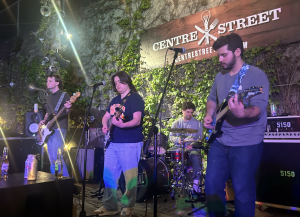The rise of neo-Nazism in Ukraine
February 24, 2022
Tensions in Ukraine have continued to rise as nations and international organizations become increasingly involved in Ukraine-Russian relations. For instance, NATO—and most notably the United States—have continued to escalate tensions in Ukraine by deploying around 3,000 new troops to Eastern Europe and considering economic sanctions against Russia. As reported by Newsweek, many countries are willing to largely look the other way when it comes to the emergence of fascism and neo-Nazism in Ukraine with Russia being viewed as a threat to NATO.
According to The Nation—a progressive media outlet in the U.S.—openly right-wing, nationalist, fascist groups such as the Azov movement and the Svoboda party have grown in popularity following the 2014 Ukrainian Maidan protests that threw Viktor Yanukovych out of office. These groups now have much influence in the Ukrainian government and have rehabilitated Ukrainian fascists who fought against the Soviet Union during World War II in Ukrainian Waffen-SS brigades. Other actions taken in Ukraine by far-right political leaders include the prohibition of leftist political organizations in the country and the integration of fascist militia groups into the official Ukrainian army.
Ukraine’s history with fascism can be traced back to Nazy Germany’s invasion of the USSR starting in 1941. As pointed out in Grzegorz Rossoliński-Liebe’s 2015 paper, “The Fascist Kernel of Ukrainian Genocidal Nationalism,” Ukraine had been a republic of the USSR since 1922 and largely held by Nazi and local collaborating forces until the Soviets regained their footing against the Nazis, liberating it from Nazi occupation in 1943. During the occupation, many different people were subject to Nazi rule. Nazi war crimes committed in Ukraine included—but were not limited to—a mass execution of political prisoners, prisoners of war, Jews, and other minorities that the Nazis considered being “subhuman.” Despite the popular Soviet-backed partisan movement which sought to destabilize Nazi rule, some Ukrainians found the ideology of fascism to their liking. These collaborators were instrumental in many of the massacres perpetrated by the Nazis and formed a brigade in the German army, the “Galicia” Waffen SS brigade.
News agencies ranging from The Times of Israel to leftist magazine People’s World have reported on massive marches occurring last year in which supporters of these groups carried banners who honored Ukrainian Nazi leader Stepan Bandera and the Nazi-founded “Galicia” brigade, which was responsible for mass killings of Poles and Jews. These figures were largely portrayed as “nationalists” in western media. Recently, news source Radio Free Europe reported in a headline that “Hundreds Of Ukrainians March To Honor Controversial Nationalist Leader” in reference to a march that openly glorified Bandera. Other elements of current right-wing extremism are also treated with little concern. In Andreas Umland’s 2019 article in The Journal of Terrorism and Political Violence, “Irregular Militias and Radical Nationalism in Post-Euromaydan Ukraine,” he highlights that in western media especially, Azov and other military elements of Ukraine’s far-right are, “presented as the archetypical example of Ukraine’s…battalions” while they are radical extremist groups. For example, in some journalism that seeks to legitimize Azov, writer Anna Nemtsova of The Daily Beast claims that Azov is largely just a military organization similar to the Minutemen of the American revolution, and Nazis who happen to be part of the organization are “bad apples” compared with the rest of members.
Many in the Ukrainian government go along with the popular narrative claiming that the Azov group has been depoliticized. Azov maintains a close connection with other neo-Nazi groups, such as the American “Atomwaffen” and German “Third Path” organizations, according to the Combating Terrorism Center. Along with maintaining their strong ideological convictions of fascism, Azov has been implicated by Human Rights Watch in human rights abuses, possibly involving torture. Following recent letters sent out by Representative Elissa Slotkin (D-MI), the U.S. State Department has responded to questions relating to fascism in Ukraine by saying that, “the United States is committed to Ukraine’s sovereignty, independence, and territorial integrity in the face of unprovoked Russian aggression.”






